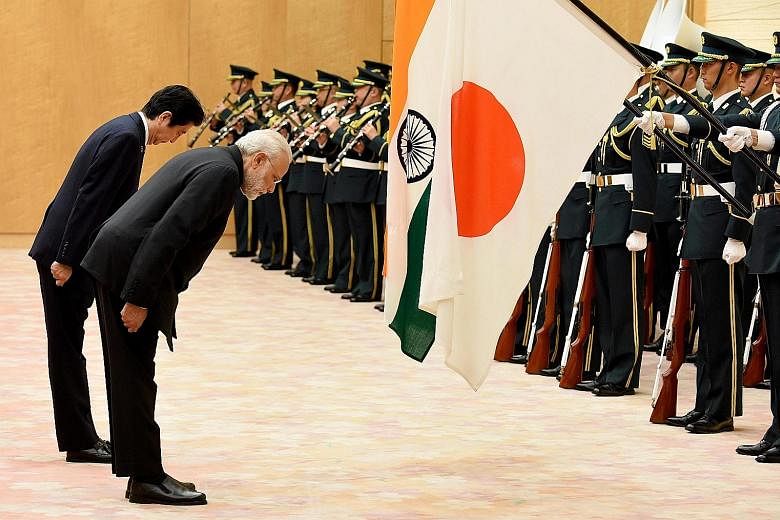Japan will soon be exporting its nuclear power plant fuel and technology to India under a landmark deal inked last night by Japanese Prime Minister Shinzo Abe and his Indian counterpart Narendra Modi.
It is the first time Japan - the only country to have suffered a nuclear attack - is entering such a pact with a nation that is not party to the Nuclear Non-Proliferation Treaty.
As a safeguard, Japan has included a clause to terminate the pact should India conduct nuclear tests, which it last did in 1998.
The deal was the result of six years of bilateral talks, and Mr Modi, who is on a three-day visit to Tokyo ending today, described it as a "historic step in our engagement to build a clean energy partnership".
To pre-empt any domestic opposition, Mr Abe stressed that the pact has included a "legal framework to ensure that India acts responsibly and uses the technology solely for peaceful means, which is consistent with Japan's purposes".
Energy-hungry India, which posted 7.6 per cent growth last year, is turning to atomic power as a renewable energy source to reduce electricity shortages and curb greenhouse gas emissions. Its nuclear power market is estimated at US$150 billion (S$211.5 billion) and it plans to boost its nuclear capacity by over 10 times by 2032.
This comes as Mr Abe eyes a stronger Japanese presence in the nation of 1.2 billion people and a closer strategic partnership between Japan and India, Asia's second- and third-largest economies respectively. "We would like to deepen our relationship further and cooperate more in issues such as peace and security, stability and prosperity," Mr Abe said yesterday, calling the Indo-Pacific region a key area.
Last night's meeting comes as security concerns mount over China's increasing military presence in the region. Both leaders stressed the rule of law and the resolution of disputes by peaceful means, without singling out any country. China has ignored a July international tribunal ruling that invalidates its claims in the South China Sea.
Japan and India have territorial disputes with China - Japan, over islets in the East China Sea, and India, over a common land border.
In a 12-page joint statement last night, the two leaders "welcomed the high degree of convergence in the political, economic and strategic interests of the two countries that provides an enduring basis for a long-term partnership". Mr Modi separately told the media both sides "have agreed to cooperate closely to promote connectivity, infrastructure and capacity-building in the regions that occupy the inter-linked waters of the Indo-Pacific".
Despite reports earlier this week that India was set to buy amphibious rescue US-2 aircraft from Japan, the deal has not happened.
A Japanese Foreign Ministry official told The Straits Times Mr Modi had said at the closed-door summit that the US-2 "has impressive technology and India will continue to examine from the standpoint of its actual needs and life-cycle costs".
Also on the agenda was a 500km high-speed railway that will connect financial hub Mumbai and economic hub Ahmedabad. The 980 billion rupee (S$20.6 billion) project will begin construction in 2018 and is expected to be operational by 2023.
Mr Abe said Japan will help to train 30,000 Indian engineers and technicians in areas such as manufacturing over the next 10 years.
Today, the two leaders will take the shinkansen or bullet train from Tokyo to Kobe, about 350km away, to visit Kawasaki Heavy Industries, a maker of bullet train cars.

